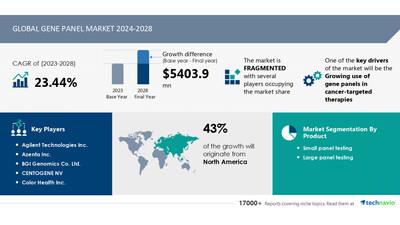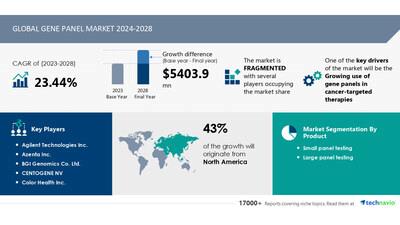
Gene Panel Market To Expand By USD 5.4 Billion From 2024-2028, Driven By Increased Use In Cancer Therapie, AI's Impact On Market Trends- Technavio Report
| Forecast period |
2024-2028 |
| Base Year |
2023 |
| Historic Data |
2018 - 2022 |
| Segment Covered |
Product (Small panel testing and Large panel testing), Technique (Amplicon and Hybridization), and Geography (North America, Europe, Asia, and Rest of World (ROW)) |
| Region Covered |
North America, Europe, Asia, and Rest of World (ROW) |
| Key companies profiled |
Agilent Technologies Inc., Azenta Inc., BGI Genomics Co. Ltd., CENTOGENE NV, Color Health Inc., Danaher Corp., Eurofins Scientific SE, F. Hoffmann La Roche Ltd., Fagron NV, GenXPro GmbH, Illumina Inc., Invitae Corp., MedGenome Labs Ltd., MGZ Medizinisch Genetisches Zentrum, Novogene Co. Ltd., OPKO Health Inc., Oxford Nanopore Technologies plc, QIAGEN NV, Quest Diagnostics Inc., and Thermo Fisher Scientific Inc. |
Key Market Trends Fueling Growth
The global life sciences tools and services market is experiencing pressure to lower costs, leading vendors to form strategic alliances along the value chain. In the gene panel market, this trend is evident with an increase in collaborations between vendors and academic institutions. Agilent Technologies Inc., a major player in gene panels, recently signed an MOU with Theragen Bio in South Korea. Under this agreement, Agilent and Theragen Bio will combine their expertise in software development, engineering, and cancer genomic profiling design to advance localized analysis capabilities and expedite treatment decisions. Agilent's SureSelect Cancer Gene Panel test, which utilizes next-generation sequencing to minimize hands-on time and maximize lab efficiency, is expected to help research organizations and vendors overcome gene panel development challenges, contributing to the market's growth.
Gene panels are becoming a significant trend in the healthcare industry, particularly in oncology where genetic alterations play a crucial role in cancer diagnosis and treatment. With rising cancer rates, personalized medicine based on genetic composition is gaining importance. Data analysis of genetic information is key to standardizing diagnostics services and enabling early screening for various diseases. Laboratories offering gene panels for oncology, carrier screening, pharmacogenomics, and chronic diseases are in high demand. Reimbursement policies and insurance coverage are crucial considerations for the clinical value of these tests. Evidence-based diagnostic panels, such as cancer panels and next-generation sequencing panels, help clinicians in disease prognostics and therapeutics. Genetic predisposition to fatalities from diseases like cardiovascular diseases, diabetes, arthritis, and multiple chronic conditions can be identified through gene panels. Early screening for diagnosed genetic conditions and monogenic defects is essential for risk factor management and improving mortality rates. Gene panels are valuable tools for clinicians in various therapeutic areas, including hereditary disorders and chronic diseases.
Discover a Comprehensive 360° Market Analysis: Understand the Impact of AI. For detailed information- Request Sample!
Market
Challenges
-
The global gene panel market is experiencing challenges in implementing large Next-Generation Sequencing (NGS) gene panels due to several factors. The need for a comprehensive understanding of the mutational profile of various genes for effective cancer treatment is driving the adoption of NGS. However, the lack of knowledge about rare variants not available in public databases or without published functional studies poses a significant challenge. Small and medium-sized hospitals and clinics face difficulties in interpreting unknown variants and validating NGS panels with well-established disease genes. The presence of variants with uncertain significance in combination with a pathogenic variant and variants associated with another genetic disease further complicates matters. Converting pathogenic genetic data into a primary diagnostic tool for clinical decision-making and patient management is another challenge. The implementation of NGS requires a sophisticated bioinformatics infrastructure, which most hospitals and clinics lack. These factors may hinder the growth of the global gene panel market during the forecast period.
The Gene Panel Market is experiencing significant growth due to the increasing demand for genetic testing in various fields, including healthcare and research. One of the main challenges in this market is the need for prognostic steps and therapeutic regimes based on gene panels. Pre-designed and customizable gene panels are in high demand for pre-gestational, prenatal, and neonatal screening. Methylation microarray and genomic signatures play crucial roles in identifying genetic discrepancies, such as Down syndrome and HLA typing for transplants. Major players in the market include Illumina, CD Genomics, and NGS panels, offering solutions for tumor genes, biomarkers, and microsatellite instability (MSI). The test kits segment utilizes amplicon-based approaches and next-generation sequencing for genotyping and CRISP validation. Hospitals and diagnostic laboratories use these gene panels for cancer risk assessment, congenital diseases, and hereditary disorders. The market also caters to rare disorders and hereditary cancer panels. Genomic technologies, including sequencing and genetics, continue to evolve, providing valuable insights into inherited SNPs, Indels, and hybridization approaches.
For more insights on driver and challenges
-
Download a Sample Report
Segment Overview
This gene panel market report extensively covers market segmentation by
Product-
1.1 Small panel testing
1.2 Large panel testing
-
2.1 Amplicon
2.2 Hybridization
-
3.1 North America
3.2 Europe
3.3 Asia
3.4 Rest of World (ROW)
1.1
Small panel testing-
The Gene Panel Market refers to the segment of the diagnostic industry focused on offering tests that analyze multiple genes at once. These panels aid in identifying genetic disorders and predispositions, enabling personalized treatment plans. Companies like Illumina, Thermo Fisher Scientific, and Myriad Genetics are key players, providing innovative solutions and expanding their product offerings. The market's growth is driven by increasing awareness, technological advancements, and the need for precision medicine.
For more information on market segmentation with geographical analysis including forecast (2024-2028) and historic data (2018 - 2022)
- Download a Sample Report
Research Analysis
Gene panels are a set of tests that analyze multiple genes associated with specific hereditary disorders, monogenic defects, and genetic predispositions to various diseases. These disorders include, but are not limited to, hereditary cancers, cardiovascular diseases, diabetes, arthritis, and other chronic conditions. The mortality rate for many of these conditions can be significantly reduced through early diagnosis and personalized therapeutic interventions. Clinicians use gene panels for disease prognostics and to identify genetic alterations that may contribute to an individual's risk for multiple chronic conditions. Genomics and sequencing technologies have made gene panels more accessible and affordable, leading to increased use in oncology, genetics, and other therapeutic areas. Test kits for genetic screening are widely available for adults and can provide valuable information for disease prevention and management. Gene panels play a crucial role in the diagnosis and treatment of genetic disorders and can help improve patient outcomes. Cancer rates continue to rise, making genetic testing an essential tool for identifying individuals at high risk and providing opportunities for preventative measures. Personalized medicine, which takes into account an individual's genetic composition, is becoming increasingly important in the healthcare industry, and gene panels are a key component of this approach.
Market Research Overview
Gene panels are a crucial advancement in the field of genetics, offering comprehensive analysis of multiple genes associated with various hereditary disorders and cancer. These panels help in identifying genetic predispositions, enabling early screening, disease prognostics, and therapeutic regimes for diagnosed genetic conditions. Hereditary disorders encompass a wide range of monogenic defects, including Down syndrome, and cancer, which have significant mortality rates and incidence rates. Gene panels are designed to detect genetic discrepancies through methods such as methylation microarray, genotyping, and next-generation sequencing. Clinicians utilize gene panels to assess cancer risk, diagnose congenital diseases and disorders, and provide personalized medicine. Pre-designed gene panels are available for specific disorders, while customizable ones cater to individual needs. Biomarkers, tumor genes, and genomic signatures are essential components of gene panels, providing valuable insights into disease progression and therapeutic responses. Major applications of gene panels include cancer risk assessment, pre-gestational screening, prenatal screening, and neonatal screening. Technologies such as Illumina, CRISP validation, and NGS panels are integral to gene panel development. Hospitals and diagnostic laboratories are significant end-users of gene panels, with reimbursement policies and insurance coverage playing a crucial role in their adoption. Gene panels offer significant clinical value, with evidence-based data analysis and standardization being essential for their successful implementation. The market for gene panels is vast, including test kits segment, amplicon-based approach, hybridization approach, and next-generation sequencing. Rare disorders, hereditary cancer panels, and pharmacogenomic panels are other significant segments within the gene panel market. In conclusion, gene panels represent a significant advancement in the field of genetics, offering comprehensive genetic screening, early detection, and personalized therapeutic regimes for various hereditary disorders and cancer. The market for gene panels is vast and diverse, with numerous applications, technologies, and end-users contributing to its growth.
Table of Contents:
1 Executive Summary
2 Market Landscape
3 Market Sizing
4 Historic Market Size
5 Five Forces Analysis
6 Market Segmentation
-
Product
-
Small Panel Testing
Large Panel Testing
-
Amplicon
Hybridization
-
North America
Europe
Asia
Rest Of World (ROW)
7 Customer Landscape
8 Geographic Landscape
9 Drivers, Challenges, and Trends
10 Company Landscape
11 Company Analysis
12 Appendix
About Technavio
Technavio is a leading global technology research and advisory company. Their research and analysis focuses on emerging market trends and provides actionable insights to help businesses identify market opportunities and develop effective strategies to optimize their market positions.
With over 500 specialized analysts, Technavio's report library consists of more than 17,000 reports and counting, covering 800 technologies, spanning across 50 countries. Their client base consists of enterprises of all sizes, including more than 100 Fortune 500 companies. This growing client base relies on Technavio's comprehensive coverage, extensive research, and actionable market insights to identify opportunities in existing and potential markets and assess their competitive positions within changing market scenarios.
Contacts
Technavio Research
Jesse Maida
Media & Marketing Executive
US: +1 844 364 1100
UK: +44 203 893 3200
Email:
[email protected]
Website:
SOURCE Technavio

Legal Disclaimer:
MENAFN provides the
information “as is” without warranty of any kind. We do not accept
any responsibility or liability for the accuracy, content, images,
videos, licenses, completeness, legality, or reliability of the information
contained in this article. If you have any complaints or copyright
issues related to this article, kindly contact the provider above.


















Comments
No comment